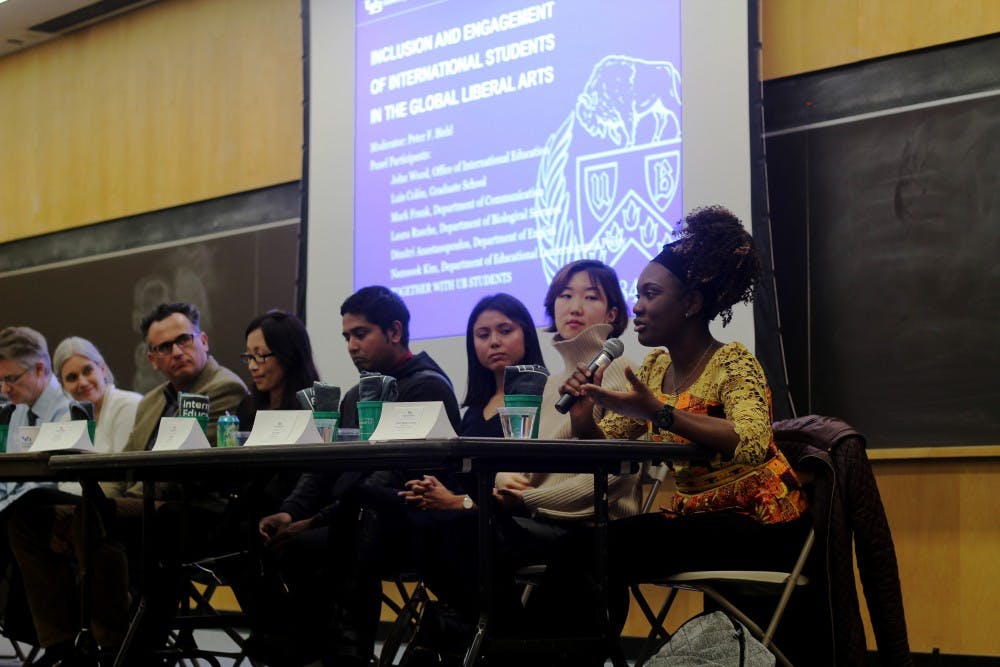Daae Jung said she believes international students should demand a refund from UB.
“I mean what are [international students] getting, other than this really traumatizing experience of isolation and even humiliation,” Jung, a graduate student in the English department, asked.
Jung and other international students discussed their views on UB’s commitment to international students on Monday. UB community members held an “Inclusion and Engagement of International Students in the Global Liberal Arts” panel at 120 Clemens Hall. Roughly 25 people attended the panel discussion.
Panel members included John J. Wood, interim vice provost for international education, and four international students. Peter Biehl, associate dean of international education and enrollment, moderated the panel. Biehl was also the chairman of UB’s international inclusion and engagement task force, which made recommendations to improve UB’s international community involvement in 2016.
On the panel, graduate students offered different perspectives on the university’s engagement with international students. Although one student, Tanvir Amit, spoke at length about his “welcoming” and “friendly” experience at UB, other students said UB hasn’t adequately supported international students.
Graduate students on the panel, such as Zena Toh and NofisatOlajumoke-Adekunle,said they initially felt discouraged by UB’s efforts. They said they wanted to quit their respective programs.
“At the end of my first semester, I felt entirely miserable. I didn’t think I was smart enough, I didn’t think I was good enough and I wanted to quit the program,” Toh said.
Toh told The Spectrumshe was concerned about her safety and well-being, and she felt she had no one to turn to for help. She also said faculty and staff have “a tendency to be dismissive and lack basic listening skills.”
But Toh credited her adviser, communication professor and panelist Mark Frank, who Toh said she knew from her time in UB’s Singapore communication program. Toh said Frank helped her tackle challenges she faced as an international student but said not all students may have a mentor like Frank.
Other students, such as Jung, said they feel international students in liberal arts programs are more prone to trauma and isolation at UB. She said friends in different liberal arts departments had trouble finding mentors and faculty for their dissertations.
Wood responded to Jung, and said he was sorry to hear about her friends’ experiences. He said it wasn’t the first time he had heard of such situations.
“Perhaps there are some instances where faculty avoid international students because they may feel there’s more work involved for them,” Wood said.
He said it was “regrettable.” Him and Biehl made recommendations to combat the situation in their 2016 task force report.
Wood said Biehl’s task force made other recommendations toward UB’s curriculum.Wood pointed to the UB curriculum’s Global Pathway, a general education element which encourages students to connect themes from international cultures.
Wood said UB’s efforts “internationalize” the university experience for domestic students.
Walter Hakala, a professor in UB’s Asian Studies Program, challenged Wood’s assertion during the event’s Q&A portion. Hakala said the curriculum does not reflect the growing diversity among the student body, with only 48 percent of students being European American. He also said there are seven professors who teach 17th century England, and none who focus on non-colonial African languages, Russia and Southeast Asia.
Wood said curriculum changes are left to the discretion of UB’s individual schools and departments, but he supported the move toward more internationally focused curriculums.
Luis Colón, a panelist and chemistry professor, said the curriculum’s lack of representation is a nationwide problem. He said the underlying problem is funding and UB is doing the best it can.
Hakala interjected Colón’s response, and said other schools have more internationally-focused curriculums such as SUNY Binghamton and SUNY Stony Brook. Hakala responded to Colón’s claims and said international students pay UB roughly triple the fees that domestic students pay.
Later in the event, Olajumoke-Adekunle spoke about funding and claimed, as an international student, she pays close to $100,000 to go to UB. She said she didn’t understand why there aren’t more resources available to international students.
Dimitri Anastasopoulos, panelist and English professor, asked panelists about incorporating international English and literature courses in UB composition classes. He said he actively campaigned to bring diversity to the English department. Anastasopoulos also said enrollment and departmental pressures prevented these changes from happening.
UB has taken steps to improve international support for students seeking careers in the United States, according to Biehl. Given the American immigration climate, International Student Services is advising students on how to get approval for Optional Practical Training.
Biehl said ISS is regularly updated on new immigration legislation and said the office works closely with an immigration lawyer to aid students.
Tanveen Vohra is an assistant features editor and can be reached at features@ubspectrum.com.
Tanveen Vohra is a former senior news editor and covered international relations and graduate student protests.






